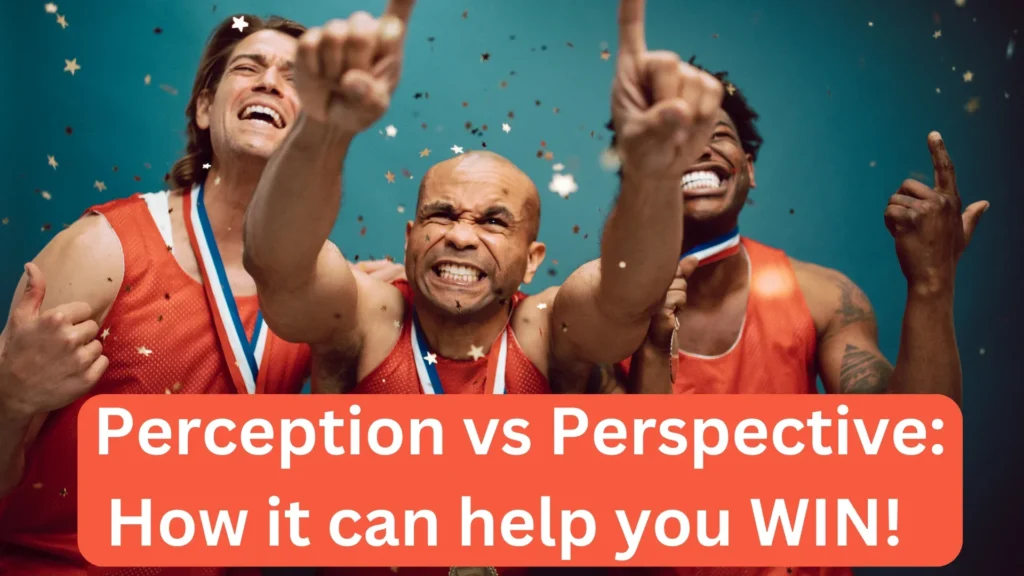
As a performance psychologist, I am constantly reminded of the powerful impact that perception vs perspective have on our ability to reach high performance.
These two terms, often used interchangeably, actually have distinct meanings and understanding the difference between them can greatly enhance our journey towards success.
In this article, we will explore what perception and perspective are, how they differ, and why knowing the difference is crucial in achieving our goals.
What is perception?
Perception is the way we interpret and make sense of the world around us.
It is our ability to see, hear, and become aware of something through our senses.
Our perceptions are shaped by our beliefs, experiences, and cultural background.
They influence how we understand and assign meaning to the events, people, and objects in our lives.
Perception is not a one-size-fits-all concept. It varies from person to person, as each individual has their own unique set of filters and biases that shape their interpretation of reality.
For example, two people can witness the same event, but their perceptions of what happened may differ based on their personal experiences and beliefs.
What is perspective?
Perspective, on the other hand, refers to the particular attitude or point of view that we adopt towards a certain situation or topic.
It is the lens through which we see the world and interpret our experiences.
Perspective is influenced by our perceptions, but it goes beyond them. It is a broader framework that encompasses our beliefs, values, and personal history.
Our perspective shapes how we make decisions, solve problems, and navigate through life.
It influences our goals, priorities, and the actions we take to achieve them.
Just like perception, perspective is subjective and can vary greatly from person to person.
What is the difference between perception vs. perspective?
While perception and perspective are closely related, they are not the same thing.
Perception is the process of interpreting sensory information, while perspective is the overall framework through which we view the world.
Perception is more immediate and sensory-based, while perspective is a broader, more abstract concept that encompasses our beliefs and values.
To illustrate the difference, let’s consider a simple example. Imagine you are looking at a glass of water that is filled halfway.
Your perception would be the sensory input you receive – the visual image of a glass with water.
However, your perspective would determine how you interpret this image. You could see the glass as half empty or half full, depending on your perspective.
What are the similarities between perspective and perception?
While perspective and perception are distinct concepts, they share some similarities:
- Subjectivity: Perspective is like your personal lens on the world, shaped by what you’ve been through and what you believe.
Perception, on the other hand, is all about how you personally interpret and make sense of what you see, hear, and feel – it’s your brain’s unique take on things.
- Influence on Understanding: Both perspective and perception have a say in how we get what’s going on around us.
Perspective sets the stage for how we approach and grasp the world, while perception is like our ongoing commentary, deciding how we react to everything based on sensory input.
- Role in Interpretation: Think of perspective as the opening act, setting the mood for how we first understand something.
Perception then takes the spotlight, running the show by organizing and making sense of what our senses throw at us, shaping our ongoing reaction to it all.
- Individual Variability: Just like everyone’s got their own flavor of music preference, both perspective and perception vary from person to person.
Perspective changes based on backgrounds and personal stories, and perception?
Well, it’s a wild ride too, with each of us seeing and feeling things in our own unique way.
- Dynamic Nature: Perspectives aren’t set in stone; they can evolve as we experience new things or learn more.
And perception?
That’s the quick thinker, adapting on the fly to process new info and tweak how we see the world.
- Cognitive Processes: In the brain department, perspective is like your thinking cap, influencing how you reason and judge stuff.
Meanwhile, perception relies on your noggin too, organizing the sensory overload into something that makes sense to you.
In essence, both perspective and perception are subjective, individualized processes that play crucial roles in shaping how you understand and interact with the world around you.
They are intertwined elements of cognition that contribute to the richness and complexity of human experience.

Examples of how perception and perspective work
To further understand the difference between perception vs. perspective, let’s dive into a story.
Two friends, Jake and Emily, stand out for their unique perspectives and perceptions of the world.
They’re known for seeing the world in completely different ways, and their quirks come to the forefront when they decide to explore a mystical forest that’s the talk of the town.
As they step into the forest, Jake, the thrill-seeker, is all about adventure and discovery.
He sees it as a golden opportunity to stumble upon hidden gems and mythical creatures. His vibe is all curiosity and excitement.
On the flip side, there’s Emily, the cautious one. She eyes the forest with a raised eyebrow, thinking about potential dangers lurking in the shadows. Every rustle of leaves gets the side-eye treatment as she tiptoes forward.
As they delve deeper into the forest, their differing perspectives and perceptions influence their reactions.
Jake, with his adventurous perspective, embraces the unknown with open arms. To him, the twisted vines are a work of art, and the rustling leaves compose a symphony of nature.
On the other hand, Emily’s cautious perception makes her hesitant. She is playing it safe, watching her every step, eyes peeled for trouble.
The plot thickens when they stumble upon a hidden glade, an ancient beauty tucked away in the heart of the forest.
Here, their perspectives meet in the middle as they both stand in awe of the enchanting scene.
Jake’s adventurous take appreciates the find, and Emily’s cautious side gives a nod to staying alert in unknown territory.
This little adventure paints a picture of how perspectives shape our initial reactions, and perceptions guide our ongoing understanding.
Jake’s thirst for adventure leads them into the forest, and Emily’s cautious radar keeps them on their toes.
But when they discover the hidden glade, their perspectives click, showing that both can mesh together and give us a fuller picture of the world.
To further understand how we can use these concepts to our advantage let’s imagine a talented musician named Sarah.
She has been practicing for months to prepare for a music competition. On the day of the competition, she makes a mistake during her performance and receives a lower score than expected.
Sarah’s perception of this event could be that she failed and is not good enough as a musician. This perception is influenced by her belief that success is measured solely by external validation and flawless performances. She feels disappointed and discouraged, seeing this setback as a reflection of her worth as an artist.
However, if Sarah were to shift her perspective, she could see this event as an opportunity for growth and learning.
She could perceive the mistake as a valuable lesson that will help her improve in the future.
By reframing her perception and adopting a growth mindset, Sarah can use this experience to fuel her determination and continue striving for excellence.
Why knowing the difference between perception and perspective is important in reaching high performance
Understanding the difference between perception and perspective is crucial for reaching high performance in any domain of life. Here are a few key reasons why:
Recognizing our own perceptions and perspectives allows us to gain a deeper understanding of ourselves and our thought patterns.
This self-awareness is essential for personal growth and development.
Also, by examining our perceptions and perspectives, we can identify any limiting beliefs or biases that may be holding us back.
We can then challenge and reframe these beliefs to overcome obstacles and achieve our goals.
Having a broad perspective enables us to see multiple sides of a situation and make more informed decisions.
It helps us consider different viewpoints and weigh the pros and cons before taking action.
When we encounter setbacks or failures, our perspective plays a crucial role in how we respond to these challenges.
By adopting a growth mindset and reframing our perceptions, we can bounce back stronger and more resilient.
Understanding that others may have different perceptions and perspectives helps us cultivate empathy and build better relationships.
It allows us to see different viewpoints and communicate more effectively with others.
Conclusion
In conclusion, perception vs perspective are two intertwined concepts that shape our understanding of the world and our actions within it.
By recognizing the difference between perception vs. perspective, we can harness their power to reach high performance and achieve our goals.
So, I invite you to reflect on your own perceptions and perspectives, and explore how they can be adjusted to unlock your full potential.
If you’re interested in exploring more resources and success stories related to high performance and personal growth, I invite you to join the Success Stories Community.
It’s a world of knowledge, growth, and success where like-minded individuals come together to support and inspire each other on their journey towards excellence.
Remember, perception and perspective are not fixed entities.
They can be shaped and refined through self-reflection, learning, and open-mindedness.
Embrace the power of perception and perspective, and watch as they propel you towards the heights of success!



